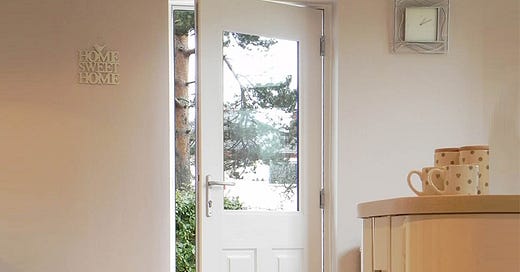The EUA-Psychedelics Backdoor Cracks Open Further
More evidence supporting a COVID-19 EUA for psychedelics
As I put the finishing touches on a post about the AIDS pandemic—and how it led to the precipitous rise of the FDA-pharma-industrial complex—a new research study interrupted my flow. It relates to my last post on the more recent COVID-19 pandemic, Emergency Use Authorizations (EUA), and psychedelics.
(To recap, my last essay proposed an unconventional legal strategy for how HHS could rather quickly introduce psychedelics and assisted-therapy into the medical system through the backdoor: Emergency Use Authorizations. Read it.)
Allora. Yesterday, Marijuana Moment published an article about this new study. Rather than reinvent the wheel, I’ll reproduce its first two paragraphs:
A newly published report in the Journal of the American Medical Association (JAMA) finds that psilocybin-assisted therapy in a group of frontline clinicians during the COVID-19 pandemic “resulted in a significant, sustained reduction of symptoms of depression.”
“In this randomized clinical trial, we aimed to investigate whether psilocybin therapy could improve symptoms of depression, burnout, and PTSD in clinicians who developed these symptoms from frontline clinical work during the pandemic,” authors wrote in the new report, adding that their findings “establish psilocybin therapy as a new paradigm of treatment for this postpandemic condition.”
The study concluded that psilocybin therapy resulted in a “significant, sustained reduction in symptoms of depression experienced by clinicians after frontline work during the COVID-19 pandemic.” That’s interesting.
So, I took a look at the underlying study. No slouch of a study. Small sample size, sure. But backed by the Cohen Foundation, the Riverstyx Foundation, and the Rita and Alex Hillman Foundation, it directly investigated the key question for an EUA:
Does psilocybin therapy improve symptoms of depression, burnout, and posttraumatic stress disorder in clinicians who developed these symptoms from frontline clinical work during the COVID-19 pandemic?
Consider the importance of the findings, if further validated. During preparation sessions, the health care workers made comments like “I feel more disposable than a used COVID-19 swab” and “It got to the point where I felt like I was participating in the torture of people.” Setting aside COVID-19 itself, having these sentiments among the public health workforce itself is a public health emergency.
And remember, the key to this backdoor isn’t establishing that COVID-19 is a public health emergency—that’s established. Rather, it requires showing:
COVID-19 can cause a serious or life-threatening disease or condition;
Based on the totality of scientific evidence available to the Secretary, including data from adequate and well-controlled clinical trials, if available, it is reasonable to believe that the product may be effective in diagnosing, treating, or preventing
that disease or condition; and
No adequate, approved, and available alternative to the product for diagnosing, preventing, or treating that disease or condition.
This study, while small, did it the mighty way: randomized clinical trial, the gold standard of evidence-based medicine. True, there was “functional unblinding”—all participants knew about 2-hours in which therapy they received. But this is inherent to many psychedelics when used as therapeutics. And, here’s the other thing: the EUA statute is flexible enough to allow HHS to rely on the “totality of scientific evidence available to the Secretary.” That includes a whole lot: not just this study, but a bevy of other clinical and non-clinical research related to psilocybin’s medical uses.
See where I’m going with this?
Importantly, as my last post emphasized, while an HHS-led psychedelics EUA might push the boundaries of the statute, it might be exceedingly difficult to flip over in court due to standing doctrines. So, as a practical matter, an EUA with a colorable basis in science and logic may be un-voidable in court.
But here’s the really important last item: an EUA could force rescheduling.
As I’ve noted many times in many places, FDA-approval and scheduling/rescheduling under the Controlled Substances Act are two distinct enterprises. But, the CSA does incorporate an element of “accepted medical use.” And, once HHS blesses a controlled substance for a medical use—and it is exceedingly hard to argue that an EUA, even if unapproved by FDA, isn’t a medical use—that substance can’t remain in Schedule I.
TL;DR: Increasingly likely pandemic related mental illness could be legally used to reschedule controlled substances before FDA approval.




Hey Matt, I’m the first author on the frontline clinician study. Would you be open to a chat about your idea? Email me at tonyback@uw.edu—I’ll be back in the office Monday.